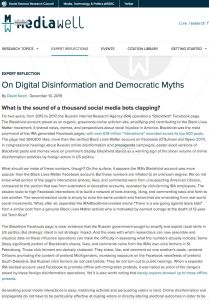Join getAbstract to access the summary!

Join getAbstract to access the summary!
David Karpf
On Digital Disinformation and Democratic Myths
MediaWell, 2019
What's inside?
Digital disinformation campaigns may undermine democracy without convincing anyone to vote one way or another.
Recommendation
Between 2015 and 2017, a Russian organization ran a Facebook page promoting issues related to the Black Lives Matter movement. Designed to sow racial division in the American electorate, the site’s posts received countless likes and shares, but its effect on ordinary Americans remains unclear: most of the attention came from Russian “click farmers.” David Karpf, writing for Mediawell, says that while it’s hard to generate attention on social media, it’s even harder to convince people to vote. Nevertheless, digital disinformation campaigns can damage the functioning of a democracy. This article will engage anyone concerned about the integrity of American elections.
Summary
About the Author
David Karpf is Associate Professor of Media and Public Affairs, George Washington University.
















Comment on this summary